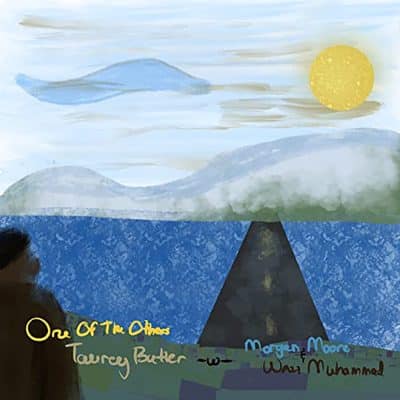Taurey Butler One Of The Others
One Of The Others
Justin Time
Taurey Butler is a Montreal-based pianist who originally hails from East Orange, NJ. One of the Others is his second release for Justin Time Records, with his self-titled debut hitting in 2011. This is a trio album, featuring his usual performing band with Wali Muhammad on drums and Morgan Moore on bass. Gleaning Butler’s touring schedule, he leads this trio on most dates and is sideman for such acclaimed artists as Nicole Glover and Jim Doxas. The Justin Time label specializes in jazz, blues, and gospel and fittingly, you’ll hear strains of all three in Butler’s piano playing. Even in the opening titular track, we hear echoes of the late Ramsey Lewis and trills like Les McCann. Typheahe album is mostly Butler originals with a nod to Charlie Chaplin’s oft covered “Smile,” with one each from Cole Porter, The Beatles, and Stevie Wonder.
“Artis’ Truth” is a thoughtful, involved piece that moves through several dynamic shifts, from the mostly admirably pensive to rollicking and then back. It honors two great North American Black women – the Canadian-born artist Artis Lane who is the sculptor of the bust of Sojourner Truth, the first sculpture honoring an African American woman, unveiled at the U.S. Capitol in 2009 under the Obama administration. “Swappin’ Lies” moves at an upbeat tempo, as Butler conveys through his music wit, braggadocio and the usual story embellishment that occurs when men get together in a social setting. “On the Natch” is a bluesy shuffle, with elements of the opening track and proves a strong feature for drummer Muhammad.
Chaplin’s “Smile” was a tune Butler turned to often to help him and in turn his audiences weather the pandemic. The trio’s playful take is a mood brightener. “Nutfog” is another tune that weaves through a number of passages to depict clarity one moment, confusion the next, but ultimately a hopeful path forward. The next track, “Sisyphean Task” is also deeply personal, expressing the frustration we all often feel pushing that proverbial boulder uphill, as symbolized by the repetitive chords that follow his rambling sequences, kept steady by Moore’s walking bassline.
Butler puts his own bluesy stamp on Cole Porter’s “What Is This Thing Called Love” and in a clever bit of sequencing addresses the same subject with a slowed-tempo, melancholy take on The Beatles’ “Can’t Buy Me Love,” marked by an especially lyrical Moore bass solo. Butler follows with the deeply personal, emotionally gripping ode to his mom, “Laini’s Love.” With an eye toward symmetry, Butler closes much as he began the album, finding a sense of belonging in new environs. We have few options but to be ourselves as Butler finds the perfect expression for such in Stevie Wonder’s “I Can Only Be Me.” It’s yet another example of Butler’s delicate balladry with Moore’s plucking adding to the pensive mood, which at times has classical overtones.
Butler’s trio delivers highly accessible fare with a strong bent toward the blues. Butler, more strongly than many pianists, deeply conveys emotion in his pianism.
- Jim Hynes
Buy Us a Cup of Coffee!
Join the movement in supporting Making a Scene, the premier independent resource for both emerging musicians and the dedicated fans who champion them.
We showcase this vibrant community that celebrates the raw talent and creative spirit driving the music industry forward. From insightful articles and in-depth interviews to exclusive content and insider tips, Making a Scene empowers artists to thrive and fans to discover their next favorite sound.
Together, let’s amplify the voices of independent musicians and forge unforgettable connections through the power of music
Make a one-time donation
Make a monthly donation
Make a yearly donation
Buy us a cup of Coffee!
Or enter a custom amount
Your contribution is appreciated.
Your contribution is appreciated.
Your contribution is appreciated.
DonateDonate monthlyDonate yearlyYou can donate directly through Paypal!
Subscribe to Our Newsletter
Order the New Book From Making a Scene
Breaking Chains – Navigating the Decentralized Music Industry
Breaking Chains is a groundbreaking guide for independent musicians ready to take control of their careers in the rapidly evolving world of decentralized music. From blockchain-powered royalties to NFTs, DAOs, and smart contracts, this book breaks down complex Web3 concepts into practical strategies that help artists earn more, connect directly with fans, and retain creative freedom. With real-world examples, platform recommendations, and step-by-step guidance, it empowers musicians to bypass traditional gatekeepers and build sustainable careers on their own terms.
More than just a tech manual, Breaking Chains explores the bigger picture—how decentralization can rebuild the music industry’s middle class, strengthen local economies, and transform fans into stakeholders in an artist’s journey. Whether you’re an emerging musician, a veteran indie artist, or a curious fan of the next music revolution, this book is your roadmap to the future of fair, transparent, and community-driven music.
Get your Limited Edition Signed and Numbered (Only 50 copies Available) Free Shipping Included
Discover more from Making A Scene!
Subscribe to get the latest posts sent to your email.











